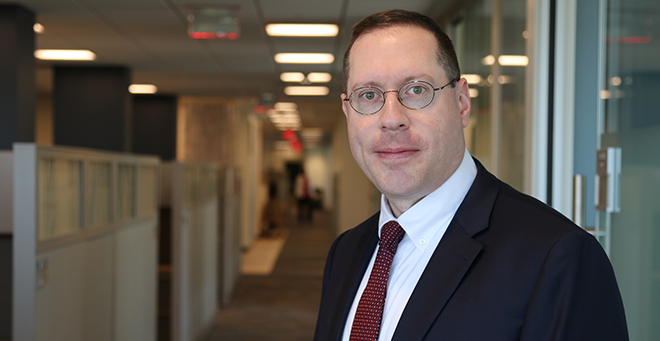
|
More than 100 critically ill COVID-19 patients in the UMass Memorial Health Care system have been treated with convalescent plasma through a UMass Medical School clinical trial led by Jonathan M. Gerber, MD, the Eleanor Eustis Farrington Chair in Cancer Research, chief of the Division of Hematology/Oncology in the Department of Medicine, medical director of the UMass Cancer Center and associate professor of medicine and molecular, cell & cancer biology. Dr. Gerber said it is too early to draw a conclusion on the effectiveness of the therapy, but it appears to be helping these very sick coronavirus patients, most of whom were on ventilators when treated.
“We’re optimistic about its potential, but we want to get a handle on what the quality of these units is with better testing and learn more about who’s responding,” Gerber said.
Transfusing blood products from those who have recovered from an infection into sick people is “a known quantity,” he said, having been used over a century ago in the 1918 influenza pandemic. He said the treatment risks are low (<1 percent), as borne out in a recent report of the Mayo Clinic’s trial.
When plasma from a COVID-19 survivor was used to successfully treat a seriously ill patient at UMass Memorial Medical Center on April 18, it was the first time the therapy had been used for the disease in Massachusetts. Now, UMMS scientists plan to do more comprehensive analyses. They will analyze donated plasma and patient outcomes to learn more about the quantity and quality of antibodies and patient characteristics associated with therapeutic effects.
The first phase of the research was to get the study running quickly and be able to deliver potentially beneficial treatment to patients, Gerber said. The next step was to set up treatment in a way that allows for researchers to go back and answer 80 percent to 90 percent of their questions by analyzing saved segments of plasma in conjunction with patient outcomes.
The third phase is to capture this information more prospectively, with additional laboratory correlates.
The next phase would be to join other national trials. Among these, Gerber said UMMS is collaborating with Johns Hopkins University to open prophylactic and early treatment trials that would be placebo-controlled, geared toward outpatients.
There haven’t been controlled comparisons for patients treated with convalescent plasma at UMMS so far, Gerber explained. “We did not think it would be ethical to take the most critically ill patients, to risk that they get a placebo or nonconvalescent plasma,” he said. “It’s basically been more of a compassionate-use design.”
Justin A. Maykel, MD, the Joseph M. Streeter and Mary Streeter DeFeudis Chair in Surgery, professor of surgery and chief of the Division of Colorectal Surgery at UMass Memorial Medical Center, was the second known COVID-19 survivor in Massachusetts to donate plasma after recovering from the disease in April. When he learned a close colleague had gotten very sick, he said, “That created a sense of urgency and allowed us to really push this thing forward in a more forceful way.”
Dr. Maykel contacted Gerber, who had joined the Mayo Clinic trial but had not enrolled patients because of limitations in the study’s eligibility criteria and design, such as limitations on dosing of plasma.
“What we ended up doing was something different from what anybody else has done, which is give one unit (of plasma) up front, but reserve the right to come back and re-dose based on how they’re doing,” Gerber said. “That has allowed us to judiciously stockpile a small bank of our own, because we can’t collect the plasma here due to a variety of regulatory limitations.”
Gerber credited the support of several UMMS and UMass Memorial groups, including the cancer research team, the Division of Hematology/Oncology, the blood bank team, the UMass Center for Clinical and Translational Science, the critical care team, and numerous physicians and nurses. In addition to redeployed staff, he said a $100,000 grant from the George I. Alden Trust and a $100,000 commitment from UMass Memorial Health Care have been a significant help, but more is needed.
He is now pursuing a partnership with industry to extract antibodies from the plasma to make a hyperimmune globulin, which would potentially be more widely available and more effective against COVID-19.
A link to donate to the COVID-19 Research Fund can be found at https://umassmed.edu/giving/areas-to-support/covid-19pandemic-research-fund/ and interested plasma donors who have recovered can register at UMassCOVIDplasma@umassmed.edu.
Read the full media stories below:
Worcester Business Journal: UMass Medical School holding coronavirus treatment, prevention studies with Johns Hopkins
WCVB-TV: Worcester researchers part of nationwide COVID-19 plasma study
Worcester Telegram & Gazette: UMass seeking help with plasma study
Worcester Business Journal: UMass Medical School holding coronavirus treatment, prevention studies with Johns Hopkins
WGBH: Convalescent Plasma Treatment For COVID-19 Patients Gets Caught In Political Crossfire
Spectrum News: UMass Medical School Looking for Patients to Participate in Plasma Trial
Boston Herald: UMass Medical School and Johns Hopkins team up for coronavirus plasma trials